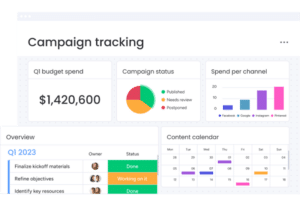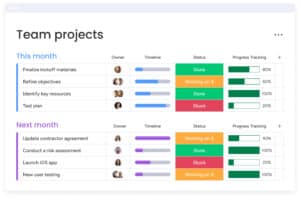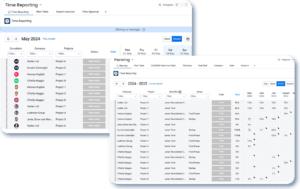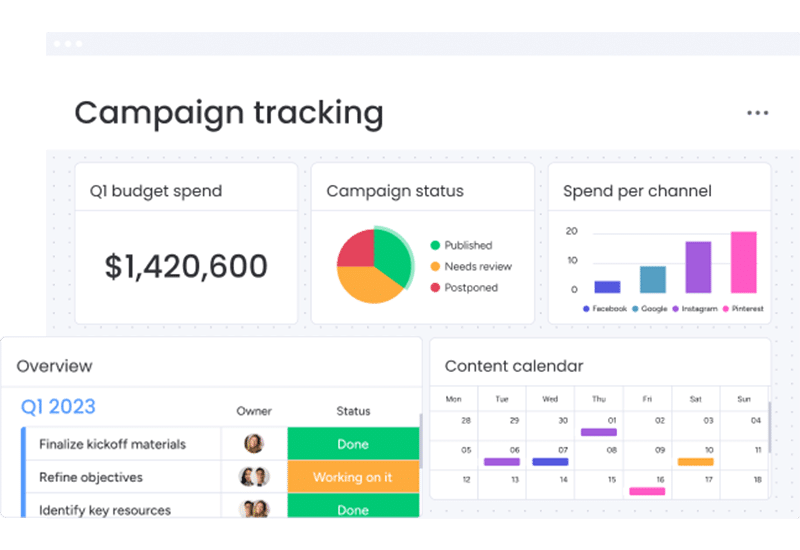Marketing forms the backbone of any successful business strategy. From brand awareness and customer engagement to conversion and loyalty, effective marketing plays a vital role in achieving various business goals. With the rise of digital technology, businesses today have access to a multitude of tools and platforms that can enhance their marketing strategies – one of the most influential among them being marketing software.
What is Marketing Software?
Marketing software is a technological solution designed to improve the efficiency and effectiveness of a company’s marketing efforts. It is a tool that helps businesses automate, measure, and streamline their marketing tasks, making them more precise and time-efficient. Whether it’s email marketing, social media management, customer relationship management, or data analytics, there is a marketing software solution designed to cater to every facet of a company’s marketing needs.
In this post, we will delve into the benefits of implementing marketing software in your business and how it can significantly enhance your marketing efforts and results. Stay with us as we unveil the transformative power of marketing software.
Understanding Marketing Software
As we move forward in the digital era, a solid understanding of marketing software is key for any company aiming to keep up with market trends and customer behavior. But what exactly is marketing software, and what does it encompass?
What Constitutes Marketing Software?
At its core, marketing software is a tool designed to help businesses automate and manage their marketing tasks. These tools can handle a wide array of functions, from email campaigns and social media posts to tracking customer behavior and providing analytics for decision-making.
Marketing software solutions come in different types, each tailored to a specific facet of marketing:
- Email Marketing Software: Enables businesses to automate their email campaigns, manage mailing lists, and track campaign performance.
- Social Media Management Tools: Help manage and monitor social media presence, schedule posts, and analyze social media engagement.
- Customer Relationship Management (CRM) Software: Provides a comprehensive view of customer interactions across all touchpoints, helps track sales activities, and improves customer service.
- Search Engine Optimization (SEO) Tools: Assist in improving website visibility, track keyword rankings, and provide insights into website performance.
- Content Management System (CMS): Helps manage digital content creation and modification, making content marketing strategies easier to implement.
- Marketing Analytics Tools: Collect and analyze data from various marketing channels to measure the effectiveness of marketing strategies and guide decision-making.
- Marketing Planning Software: Enables businesses to plan, manage, and optimize their marketing strategies, providing a centralized platform for all marketing activities and goals.
These tools are not isolated but instead often integrate with each other to offer a holistic view of a company’s marketing performance. They are part of the broader marketing technology landscape, also known as ‘martech,’ which includes any tools that a business uses to reach, engage, and serve its customers.
In the next section, we’ll explore the importance of marketing software and why it’s a crucial investment for businesses in the modern marketplace.

The Importance of Marketing Software
In an increasingly competitive business environment, having a robust marketing strategy alone is not enough. To gain an edge, companies must leverage the right tools, one of the most critical being marketing software.
Streamlining Operations in a Fast-Paced Business Environment
Today’s business world is more dynamic and fast-paced than ever. The rise of digital platforms has significantly increased customer touchpoints, thereby complicating marketing operations. Marketing software steps in to simplify these complexities. It automates routine tasks, thereby freeing up time for your team to focus on more strategic initiatives.
Data-Driven Decisions and Insights
In addition to simplifying operations, marketing software is instrumental in providing data-driven insights. Today’s market is inundated with data, making it almost impossible for businesses to manually track and analyze all available information. Marketing software helps companies navigate this sea of data by automatically collecting, tracking, and analyzing data from various sources. This provides businesses with actionable insights and empowers them to make more informed decisions.
In essence, marketing software not only automates marketing operations but also provides valuable insights that can drive a company’s marketing strategy. By doing so, it plays a crucial role in helping businesses stay competitive and achieve their marketing goals in an increasingly digital world. In the next section, we’ll delve deeper into the specific benefits of implementing marketing software.
The Benefits of Implementing Marketing Software
Implementing marketing software can bring a plethora of benefits to a company’s marketing operations and overall business strategy. Let’s delve into some of these key advantages.
Cost-Effectiveness and Efficiency
One of the most significant advantages of marketing software is its ability to increase efficiency while decreasing costs. By automating repetitive tasks, marketing software allows your team to focus their efforts on other strategic tasks, leading to better use of time and resources. This results in substantial savings in the long run and a higher return on investment.
Scalability
As your business grows, so does the complexity of your marketing operations. Marketing software allows for scalability by easily adapting to your growing needs. This means you can manage an increasing volume of work without necessarily expanding your workforce, hence controlling costs and maintaining efficiency.
Increased Productivity
By automating routine tasks, marketing software can drastically increase your team’s productivity. This means less time spent on mundane tasks and more time on strategic thinking and creativity, leading to more effective marketing campaigns and strategies.
Data-Driven Decision Making
Marketing software provides a wealth of data on customer behavior, campaign performance, and market trends. This data is crucial for making informed decisions. With real-time analytics and reporting, businesses can continuously track and adjust their marketing strategies based on performance, ensuring that their efforts yield the best results.
Personalization
In today’s competitive marketplace, personalization is key to standing out. Marketing software enables companies to tailor their communications based on customers’ preferences, behavior, and previous interactions, thereby enhancing customer experience and boosting customer loyalty.
Consistency
Marketing software allows for uniformity in branding and communication across various platforms, ensuring a consistent brand image and message. This consistency is vital for brand recognition and trust, both of which are crucial for a company’s success.
Integration
Marketing software can easily integrate with other systems such as CRM, sales, and customer service systems. This integration offers a comprehensive view of the business, helping companies align their marketing strategies with other business objectives.

How to Choose the Right Marketing Software for Your Company
Now that we’ve highlighted the numerous benefits of marketing software, the next step is selecting the right tool that aligns with your business’s needs. This is a critical step as the right marketing software can revolutionize your marketing strategy, while a mismatch can lead to wasted resources.
Understanding Your Needs and Objectives
Before diving into the wide pool of marketing software, it’s crucial to have a clear understanding of your business needs and marketing objectives. What tasks do you hope to automate? Which channels do you primarily use for marketing? Do you need help with data analytics, or is your focus more on customer relationship management? The answers to these questions will guide your selection process.
Consider Your Budget
While it’s true that marketing software can save costs in the long run, they do require an upfront investment. Therefore, it’s crucial to consider your budget. Remember, the most expensive software isn’t necessarily the best for your business. Instead, focus on finding software that offers the features you need at a price your business can afford.
Assess the Software’s Usability and Support
A good marketing software should be user-friendly. After all, a tool is only beneficial if your team can use it effectively. Look for software that is easy to navigate and doesn’t require extensive technical skills. Also, consider the level of customer support offered. Reliable customer support can make the implementation process smoother and help solve any issues quickly.
Check for Integration Capabilities
In today’s interconnected business world, it’s crucial that your marketing software can integrate with other systems you use. Whether it’s your CRM, sales, or customer service system, ensure that the marketing software you choose can seamlessly combine with these platforms for a more comprehensive view of your business.
Seek Reviews and Testimonials
Lastly, before making a decision, seek reviews and testimonials from other users, particularly those in your industry. This can provide valuable insight into the software’s performance and reliability. Most companies offer a trial period for their software, so take advantage of this to test whether the software meets your needs.
Choosing the right marketing software might seem daunting, but by considering these factors, you can ensure that you make a choice that boosts your marketing efforts and propels your business towards its goals.
Conclusion
Navigating the digital marketing landscape is a complex task, one that requires not just strategic acumen but also the right tools. And this is where marketing software comes into play.
Why monday.com?
At Omnitas Consulting, we strongly recommend monday.com as a highly effective and versatile marketing software platform. With its user-friendly interface, monday.com is designed to facilitate project management, streamline processes, and promote team collaboration. It offers customizable workflows that can cater to any team or project, providing an excellent solution for managing marketing efforts. From planning and tracking marketing campaigns to monitoring performance analytics, monday.com does it all.
More importantly, monday.com integrates well with various other tools, allowing you to create a fully interconnected ecosystem for your business operations. As a top partner of monday.com, we at Omnitas Consulting have seen firsthand the transformative impact this software can have on a company’s marketing strategy and overall business performance.
Ready to Revolutionize Your Marketing Strategy with monday.com?
If you’re ready to unlock the full potential of your marketing efforts, we encourage you to take the next step with us. At Omnitas Consulting, we don’t just recommend software; we walk alongside our clients, providing end-to-end support in their digital transformation journey. From initial setup and customization to training and ongoing support, our experts are ready to assist you in every step of your journey with monday.com.
Contact us today to learn more about how we can help you implement and optimize monday.com to meet your specific marketing needs. Let’s work together to unveil the benefits of marketing software for your business and propel your marketing strategy to new heights.
























